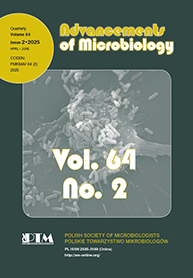Probiotyki i ich potencjalne właściwości antyoksydacyjne
1. Wprowadzenie. 2. Antyoksydanty pochodzące z żywności. 3. Probiotyki. 4. Metody analizy właściwości antyoksydacyjnych. 5. Potencjał antyoksydacyjny probiotyków. 5.1. Produkty spożywcze zawierające probiotyki. 6. Doświadczenia in vivo – modele zwierzęce. 7. Badania kliniczne. 8. Mechanizm działania probiotyków jako antyoksydantów. 9. Podsumowanie
Abstract: Human population in the XXI century is struggling with the increasing incidence of such diseases as obesity, diabetes, cancers, food allergies and many others. Recent studies have shown that oxidative stress caused by reactive oxygen species and free radicals, may underlie the occurrence of many diseases. Probiotics are known for their beneficial effects on health and are established as dietary adjuncts. Researchers are trying to find potential probiotic strains which can exhibit antioxidant properties along other health benefits. In vitro and in vivo studies have indicated that probiotics exhibit antioxidant potential. Also, many studies have shown that consumption of probiotics as dietary supplements, may reduce oxidative damage and modify activity of crucial antioxidative enzymes in human cells. Incorporation of probiotics in foods can provide a good strategy to supply dietary antioxidants, but more studies are needed to standardize the methods and evaluate antioxidant properties of probiotics before they can be recommended for their antioxidant potential. This paper presents the latest news related to probiotics and their antioxidative potential.
1. Introduction. 2. Antioxidants from food. 3. Probiotics. 4. Methods for antioxidative activity testing. 5. Probiotics antioxidative potential. 5.1. Food products containing probiotics. 6. In vivo studies – animal models. 7. Clinical trials. 8. Probiotics as antioxidants. 9. Conclusions

